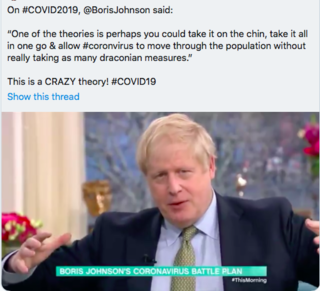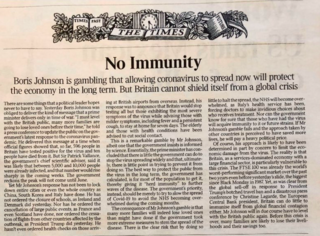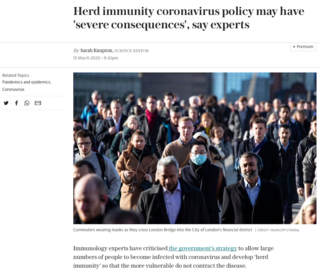Coronavirus Disease 2019
A Health Crisis and Herd Immunity
Lessons from Britain’s disastrous coronavirus response.
Posted March 19, 2020 Reviewed by Lybi Ma

Until earlier this week, when Boris Johnson’s administration in the UK made an abrupt U-turn on its approach to managing COVID-19, Britain was an outlier among OECD countries in rejecting efforts to contain and suppress the virus.
The Johnson administration ruled out mass testing, waived restrictions and temperature checks on incoming visitors, declined to trace known infections, kept schools and large events open, and played down the risk to the general public as little more than a nasty bout of flu.
Amplifying the government’s initially choreographed message, several national papers, including the Daily Telegraph, scoffed at those taking precautions and worrying that their government was not. The papers blew off international concern as hype and overreaction, even after six weeks of reporting on an epidemic still raging in China and already problematic for greater Europe. “Yes, we’re facing an epidemic,” Janet Daley opined in one column, “but it is one of panic and self-flagellation.” “After this irrational coronavirus panic,” added Bryony Gordon, immediately across from headlines indicating that a staff member in a primary school an hour from London had tested positive for the virus, “maybe we could all do with 14 days of self-isolation.”

Millennials were too nervous and skittish, the columnists believed, even as those writing for other sections of the newspaper were more forthright about anticipated results. The government’s strategy, broadly summed up as seeking herd immunity, would achieve safety for the majority and “only” seriously affect the elderly and vulnerable, especially those with comorbidities.
There would be substantial losses of “loved ones,” Johnson conceded—people like my parents and relatives, ping-ponging between pronouncements that there was nothing to worry about and stern government injunctions that they must not leave the house for 12 weeks. Still, in a model seemingly taken from The Hunger Games, post-Brexit Britain would get a bracing lesson from Social Darwinism in how to “cull” its herd and “comb” through demographic weaknesses so that survivors might at last achieve immunity.

On March 10, Johnson went on breakfast TV to float the idea at its most ludicrous and dangerous: “One of the theories,” he shrugged and smirked, citing neither precedent, reference, nor advocate, “is perhaps you could take it on the chin, take it all in one go and allow coronavirus to move through the population without really taking as many draconian measures.”
Or, to sum up his “Battle Plan” more succinctly: take virtually no measures at all, since the focus was solely on those projected to survive, not the many hospitalized from associated fevers and respiratory-pulmonary problems, as the virus was left to proliferate more or less unchecked across the country.
“To clarify,” tweeted palliative care doctor and bestselling author Rachel Clarke in response to Johnson’s ITV interview, “this means allowing the virus to run rampant, its spread unchecked, causing vastly more cases and deaths overall, and running counter to all expert advice” including that of the World Health Organization. To Richard Horton, editor of Britain’s leading medical journal The Lancet, Johnson and his closest advisors were “playing roulette with the public.” Horton later elaborated that the government was firmly responsible for “a ‘collective failure’ to appreciate the enormity of the coronavirus pandemic and enact swift measures to protect the public.”

“The consequence of Mr. Johnson’s gamble,” Rupert Murdoch’s Times subsequently stressed on its editorial page, “is that many more families will indeed lose loved ones than might have done if the government took more extreme measures to stem the spread of the disease.”
Entitled “No Immunity,” the editorial was meant to remind government and public alike of their shared, acute vulnerability before a novel coronavirus for which there was no vaccine and none likely for weeks, possibly months.
Even at this point, the Telegraph continued to report that the “UK’s Chief Scientific Adviser [Sir Patrick Vallance] says two thirds of Britain’s population would need to get coronavirus to stave off the disease in future.” This suggested problems both logical and medical at their most elemental, with advocates scarcely pausing to imagine the public health consequences for a nation of 68 million with an already overstretched and underfunded health service. Vallance later claimed that 20,000 or fewer deaths would be “a good outcome,” if still a “horrific” one, in words again poorly phrased and considered.
The horror is that the government in fact planned for and actively facilitated this outcome. No less distressing or dangerous, it did so with the wrong dataset. Bloomberg writers Suzi Ring and James Paton caught the paradox and its implications at their bluntest when characterizing the desired result as “UK Says Virus Needs to Infect 60% of Britons to Save Lives”:
The estimate of 60% equates to about 40 million cases in the UK and 800,000 deaths, assuming a fatality rate of 2%. Herd immunity is usually used in the context of diseases for which there are vaccines ... So far, there’s none for the new coronavirus.
Equally significant, herd immunity assumed that the virus would not mutate. This was on its face risky and endangering, with reports already published that two strains of COVID-19 (mild and severe) appeared to be proliferating in Lombardy, the region of northern Italy now overwhelmed by rising infections and almost two thousand deaths. As the region struggles to cope, even to conduct funerals, officials are warning that “a generation has died.”
The Telegraph could not change course or admit error without launching into a fresh attack on skeptics, critics, and the incredulous. It published an article titled “Those questioning the government’s coronavirus strategy are not only wrong, they're a danger to the rest of us.” The warning remained even as the news section broke conflicting reports: “Mass gatherings to be banned as Boris Johnson makes coronavirus U-turn.”
The government’s earlier approach of mitigation rather than outright suppression—held zealously for the crucial 4-6 weeks before infections rose steeply in Europe—had been found to be flawed and unworkable, even as prominent epidemiologists had explained why on social media weeks earlier.
“In the UK, this conclusion has only been reached in the last few days,” a report published by the Imperial College COVID-19 Response Team explained, “due to new data on likely intensive care unit demand based on the experience of Italy and Britain so far.”

Pursuing mitigation (until then the government policy) was now anticipated to result in hundreds of thousands of deaths—250,000, to be exact.
Also, the earlier modeling for the entire country was found to be off and hastily switched: “We were expecting herd immunity to build. We now realize it’s not possible to cope with that,” professor Azra Ghani, chair of infectious diseases epidemiology at Imperial College London, told journalists somewhat vaguely at the briefing.
With multiple reports now indicating that London—the nation’s epicenter for COVID-19 infections—is facing a citywide lockdown within days, the Johnson administration will be caught up in a public health and economic crisis of far-reaching significance—one likely to affect every nation and administration on Earth. Mass testing, mask-wearing, washing your hands, and social distancing/self-isolating are imperative, as are adequate protective measures, good equipment for healthcare workers and first responders, and emergency funding for public health.
Meanwhile, for those with the time and liberty to reflect, consider what it means to gaslight entire countries during a pandemic—to tell populations in Britain, the U.S., and elsewhere to minimize risk; dismiss danger as hoax and hype; cast precaution as overreaction; discourage testing; blame opponents and media for virus spread and panic; mock sensible preparedness; stoke disinformation; model faulty math; and in Britain’s case actually court and facilitate “epidemic spread” as government policy. Altogether, it is quite a lot to take in.




